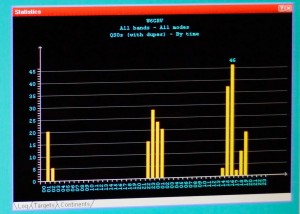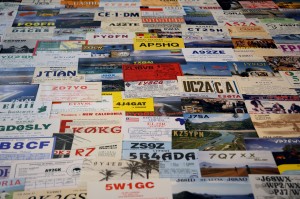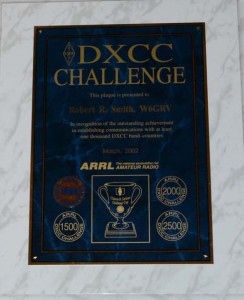DXCC Status:
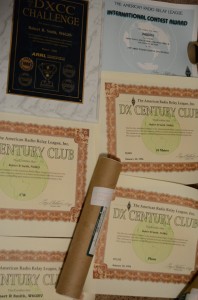 Current Countries: (340 Total)
Current Countries: (340 Total)
- Mixed: 331
- SSB: 315
- CW: 321
- DIGITAL: 106
Including Deleted Countries:
- Mixed: 339
- SSB: 321
- CW: 328
- DIGITAL: 106
DXCC Challenge: 1657
Numbers include the latest DXCC submission made using LoTW on November 26, 2014. Numbers do not include recent contacts, pending credits, or recent paper QSL cards received.
Detailed listing for Dec. 18, 2014 can be found here.
Previous listing (Oct. 15, 2013) can be found here.
- Updated DXCC Records February 20, 2015
At the end of each year, I like to update my DXCC records for DX entities by band and mode. As of November 26, 2014, I was able to obtain credit for 331 countries (mixed mode), which is enough to qualify for DXCC Honor Roll.
Also, on digital modes, over 100 countries have now been confirmed.
Continue reading → - Contest contacts October 29, 2014This past weekend, I had a some time to spend in the contest. Saturday, we went to an event is San Pedro called Steam Carnival, and Sunday, I had some things around home to get done. But there was still plenty of time to make a few contacts in the CQWW SSB contest.
Before the contest, started up the logging software (win-test), tested the equipment, and tuned up the linear for ten meters. For me, if I am able to start at the very beginning, somehow it makes me more interested in doing well in the contest. If I get a late start, or if I am not setup & ready prior to the contest, I am not as motivated to get started. This is especially true for those other contests that have a serial number in the exchange.
Friday afternoon, as the contest started, the band was filled with stations from Asia and the pacific. Starting at 28.300 Mhz, I tuned up the band and tried to work each DX station I could hear. Occasionally, I would turn the beam to South America. The station were packed up past 28.600 Mhz, and continued to 28.800 Mhz. Some stations were just too close together to get a contact with each of them. Many of the callsigns were familiar from prior contests, but it was good to hear a few new calls among the mix. I was not on for very long, but was on long enough to get me started.
I didn’t get back to the contest until Saturday afternoon. The logging software was still running, the antenna was pointed to Asia, and the linear was tuned up. Having had a start the day before, I was eager to get back into the contest. Once again, I went to 10 meters to dial up and down the band making contacts with those not already in the log. This time I stayed until the band started to fade out (or until I started to fade. I am not sure which…).
Sunday morning, I was able to get on the air shortly after the band opened to Europe. The stations were packed in all the way up to 28.900 Mhz., which was much higher in the band than I had heard in a number of years. After being in the contest for a few hours, I tuned across ZS9M and jumped into the pileup. It took awhile to get through the pileup, but after making a contact, it was time for something to eat. Then, something came up that kept me away for the remainder of the contest.
This year, it was not a serious contest effort. All the contacts were hunt and pounce. There were many long periods where I was not on the air, but I did enjoy putting some stations in the log. My log has been submitted as 10 meters, single operator, high power. Now to start thinking about the CQWW CW contest on November 29 & 30, 2014.
Continue reading → - A Slow DX day April 18, 2014
With the M7 solar flare this morning, there were only a few DX station that I could hear. I made a few contacts and sent for a few QSL cards. Many years ago, the cards I received were hung on the walls, but now they are mostly in shoe boxes. It was fun to look through the boxes, remember many of the contacts, and even see some of the handwritten notes.
.
Continue reading → - 2014 February 8, 2014
With the start of 2014, I have not spent much time on the radio. However, the FT5ZM DXexpidetion got me to dust off the equipment and warm the linear up. After making a contact with their team (for a new one on CW), I made a couple of contacts in the 10-X SSB contest. This weekend, the station is setup for the CQWW WPX SSB contest, and a handful of contacts have been put into the log.
Continue reading → - Contest Weekend October 27, 2013
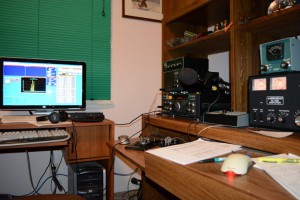 There was great propagation for this weekend’s CQWW SSB contest. Although I was only able to spend a few hours in the contest, I still enjoyed the opening into Europe and Africa on 10 Meters.
There was great propagation for this weekend’s CQWW SSB contest. Although I was only able to spend a few hours in the contest, I still enjoyed the opening into Europe and Africa on 10 Meters.Using the hunt and pounce method and staying on 10 meters only, my final count is 179 contacts, 26 zones, and 50 countries.
Continue reading → - Updated DXCC Records October 13, 2013
After sitting down to fill out the Most Wanted DX survey before it closes on Oct 15th, I realized that the list I have been using is a bit out of date. So, I went to update my excel spreadsheet for the first time on over a year. September seem to be when I update the records and make my annual submission for endorsements to my DXCC award, and today seemed like as good a day as any to update it.
There are a number of digital contacts this time, but still about 6 short of being able to apply for a digital DXCC award. For mixed, there were three new countries confirmed (PY0S, J2, and KH8 Swains Island). Using the contacts in LoTW only, an updated application was submitted. My list was updated (in pencil) with those and the cards sitting on my desk. Filling in the survey went very quickly now that my list was accurate.
Once the application is accepted and the credits are verified, I will update my list (add the pencil marks to excel file) and re-post it. Now to get back to the pileups.
Update (Oct. 15, 2013): Application was accepted, and the page with my my DXCC status is current.
Continue reading → - A contact here and there February 11, 2013
The weekend was full of fun activities. One of them was the CQ WW RTTY WPX contest. I had set up and tested the equipment before the contest. The old PC was using MixW software, connected using a RIGblaster Pro to a Yaesu FT-990 transceiver. The first couple of contacts went well, then the computer froze up a couple of times, and finally the blue screen stopped me cold. After a couple of reboots, I was back on the air.
With RTTY, I am not good at holding a frequency and calling CQ. I am just not as experienced with the software. All my contacts were made by the hunt and pounce method. I would go back to the radio and make a few contacts and then return to do other things around the house, leaving the equipment tuned up on 15 meters. The logs were hand written, and manually transcribed after the contest to convert them to ADIF format. I made a grand total of only 52 contacts, but had a good time making them.
The other fun this weekend was the Mardi Gras parade in Long Beach, and a trip to the dentist.
Continue reading → - DX Clusters on the web February 3, 2013
The DX cluster sure has evolved from the days of local friends announcing on the 2 meter repeater the DX stations that they heard. Before today, there were two DX cluster web pages that I like to watch: DX Summit and DX Watch. But today, I found another interesting page, DX for Me, that includes some real-time statistics along with the spots.
Continue reading → - New One December 2, 2012
It was good to see a couple of new confirmations on LoTW. On mixed and CW, PT0S was new for me, and on SSB and digital, TT8TT was new. Also, there were some band countries, which are fun to track as well. Thank you to the PT0S and TT8TT for the contacts & QSLs.
Continue reading → - Observation on QSLs November 28, 2012
In a recent DX news letter, there was a listing of QSL cards received. Of those listed, 22 were received via LoTW, 8 directly through the mail, and none via the bureau. Slowly more and more people are moving away from the familiar hand written paper cards to using electronic data to represent the event. We rely on bits stored on a computer we cannot see or touch.
This week I finished scanning in pictures from an old album that had been in stored on a shelf. When visiting with others, we went through some of those pictures on the computer. Some of the older pictures are now posted on a web site for other family members, however distant, to see and read the information (that was written on the back of the photos).
I enjoy picking up an old QSL card. or an old photo, and seeing the original handwriting that someone took the time to write. My handwritten logbook contains notes regarding station changes, times I operated as part of a club event, or even scribbles I made as I tried to make that new rare contact. It even contains the stain from the coffee I spilled when they came back to me. Using the sense of touch to actually hold a memory in my hands is far more fulling than looking at information on a screen.
I clearly see the changes I have made in the way I confirm contacts. Although it may take me a week or two, my logs are regularly uploaded to LoTW and eQSL. This is done about as often as I used to fill out paper cards in the 70’s and 80’s. I do not send nearly as many paper cards as in the past. Today, I used a computer to request a paper card from PT0S using their online QSL request service. I have even been delinquent in responding to a couple of direct cards. (I never used to be so slow in responding.)
I will miss the era of hand written cards with occasional mentions of the events surrounding the contact and postage stamps still on the back, slowly peeling away over time.
Continue reading → - Updated DXCC Records September 9, 2012
This weekend, I updated my DXCC records, and submitted an application for additional endorsements using the LoTW pending credits. In addition, the web page was updated to add a pull down selection under DXCC that displays my current status. Also, this new status page has a link to the detailed listing of what countries I need, in which mode, and on what bands.
Continue reading → - 2012 Most Wanted DX Survey is now open September 5, 2012
The DX Publishing, Inc. web site has their annual survey open for you input. I just finished putting in the countries that I still need. Be sure to let them know what you still need as well. Just go to their web site, click on “Most Wanted” and fill out the survey.
Continue reading → - SDR August 4, 2012
Last night, I enjoyed tuning around on the 20 meter band from a website in Romania. It was interesting to hear the opening from here in California into Europe from the European side. WebSDR is an excellent place to find software defined radio web sites.
If there was more time, it would be fun to experiment with the open source SDR software available on GNU Radio.
Continue reading → - Propagation May 22, 2012
There was a nice opening from the west coast of the United States into Europe on 15, 17 and 20 meters tonight around 0000 UTC to 0300 UTC. Hope conditions are as good for this weekend’s CQ WW WPX CW contest.
Continue reading → - OQRS May 20, 2012
Oh, how times have changed! It was not that long ago, that after making a couple of contacts with a DX expedition, I would sit at my desk, and fill out some paper cards. Next I would find some nice stamps, a couple of crisp bills, enclose an SASE, and send it off in the mail. I didn’t even mind the occasional paper cut on my tongue.
Today, I went to send a card to the 6o0CW station, but after filling out a couple of paper cards, decided to give their Online QSL Request System a try. There were no problems finding the contacts, and it was fast & easy. there is not even an envelope to take to the mail box, and no worries about having enough postage.
It is interesting watching the world change. I still like the old paper way of sending cards, but am becoming more accustom to doing things digitally.
Continue reading → - Paper or cloud February 18, 2012
I was recently asked if I still send paper cards, or if I prefer the logbook of the world. My first thought was, “of course I still send and request paper cards.” However, when I started thinking about it, that seems be less often than in prior years. In fact, I have not sent one card out via the bureau in over a year, and recently even allowed the number of envelopes at the incoming bureau drop to zero. The number of direct cards sent & requested has also dwindled down to only those needed for awards or responding to direct QSL requests.
In comparison, the electronic confirmations have been kept up to date. This includes all the contacts in hand written logs going back to 1976. The contact information has been re-typed using an ASCII editor (Notepad), converted to ADIF 1.0 format (using a simple C++ program), and submitted to both LoTW and eQSL. Recently, these electronic confirmations have been used to update awards.
The eQSL setup was straight forward, and had a simple user interface, making it a great place to start with electronic QSLs. LoTW was harder to setup, get signature certificates, keep certificates current, and even sign & submit logs. For me, once over that initial hump, electronic QSLs have been faster, easier, and less expensive.
That said, I still favor a contact confirmation that I can hold in my hand over one that lives in a cloud. Paper cards from across the globe help others to visualize amateur radio. A hand written logs is more enjoyable to read than a neatly formatted electronic list, and a hand written card is so much more personal than bits accessed with a computer. I plan to continue to send old fashion hand written cards as long as there continues to be room in the closet to put the ones received.
Continue reading → - DXCC Record Updated January 16, 2012
DXCC Status for W6GRV
- Current Only:
- Mixed: 325
- SSB: 307
- CW: 307
- Digital: 52
- With Deleted:
- Mixed: 332
- SSB: 312
- CW: 313
- Digital: 52
DXCC Challenge: 1592
Finally, these numbers have been updated to reflect my most recent submission to the ARRL. After comparing my numbers to the printout from my last application, and tracking down the discrepancies, the numbers finally match.
Now that this list is up to date, it is time to sit down with the latest cards received, and put together the next application. Also, there are a couple of confirmations pending credit in LoTW.
Continue reading → - DXCC December 19, 2011
DXCC Status for W6GRV
- Mixed: 318
- SSB: 305
- CW: 298
- Digital:40 (Ok, I need to work on this one…)
My next task is to update my DXCC records. This list has not been updated since my latest application, and I have a pile of cards for band country contacts to submit once I get some time. Also, I have a couple of new contacts pending credit in LoTW.
Continue reading →

